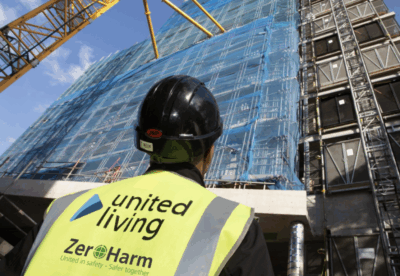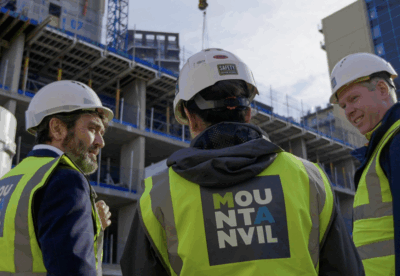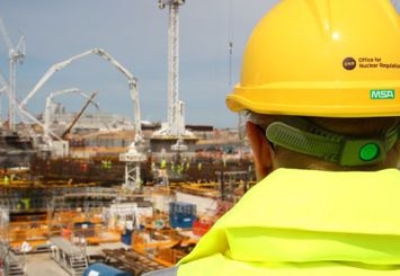A report by the independent anti slavery commissioner reveals the full extent of the gang’s operations and construction companies who “unwittingly” paid money into their accounts for workers.
The Operation Cardinas and Beyond report examines the fall-out of the investigation into a Romanian organsised crime group who placed more than 500 victims onto major projects between 2009 and 2018.
The criminals are now either in jail or awaiting sentencing while some of construction’s biggest names were interviewed as part of the report.
It stated: “The victims were usually employed as unskilled labour. Undertaking cleaning, or fetching and carrying jobs, they received less scrutiny than qualified tradespeople.
“Most were working on construction sites, but some were placed in the demolition sector and forced to do gruelling shifts without any training. The gang used a range of tactics to manipulate site security.”
The gang worked with corrupt testing centres to obtain fraudulent CSCS cards and the report highlighted “worrying systemic weaknesses in vetting and security.”
It stated: “For reasons of security and safety, most major contractors stipulate that workers must be registered and have their documentation checked before they can access a site.
“Given the rapid churn of workers, processing people places a heavy burden on resources. Responsibility is often passed down the supply chain: principal contractors will check right to work on their own employees and direct hires, but rely on suppliers to manage the process in the tiers below them.
“In the best cases, sites have airport type scanners for verifying passports, but many locations rely on staff to do visual checks. Interviewees acknowledged the risk of sophisticated forgeries being missed.
“They also said that, without specialised training, site teams could struggle to understand complex visa arrangements. The standard of labour agency processes is variable. Some are relying on video calls and photocopies of passports, rather than face to face meetings, when recruiting new workers.
In Operation Cardinas, criminals habitually found ways to undermine apparently tight security, even on large sites.”
How one subcontractor reacted to finding slave labour on is site
What does a contractor do when it suspects that there is forced labour on one of its projects? A common reaction is to remove the traffickers immediately. This strategy may minimise reputational damage, but it does little to disrupt the organised criminals that can easily move on to other targets. It also risks putting victims in greater danger.
A subcontractor had this dilemma when police first made contact while investigating Operation Cardinas. This case study explores the measures that the business took to protect workers over an 18 month period, while working closely with police.
Background
The subcontractor operates predominantly in London and the southeast, it is typically involved with between 40 and 50 live projects at any time, working on a mixture of high profile commercial, residential and mixed use developments. A high proportion of its workforce is made up of migrant workers, mainly from Eastern Europe.
The investigation
Police contacted the company’s payroll department in 2018 asking for details of two workers. After liaising with the officer, the employee decided to carry out her own payroll investigation. She discovered that a number of workers on different projects were linked to the same bank accounts.
Although the police investigation had initially focused on two people, the subcontractor now suspected that 12 potential victims were hidden within its operations.
Protecting victims
After discussions with the police, the company agreed to keep the victims working on its sites, so that the investigation could continue without alerting the traffickers. At this point, many companies would have decided to terminate contracts in order to reduce corporate risk. But the company’s first priority was to protect the victims.
The construction director said: “At this point I took a deep breath. It’s a natural instinct to want to get rid of the risk immediately, but we didn’t want to kick the problem down the road. We wanted to manage it. We felt a moral commitment to the people that were being abused.”
Health, safety and wellbeing
While the investigation was ongoing, there were significant health and safety risks to manage. The general health of the victims was not known. If, as was suspected, they were not getting enough food and rest, they posed a danger to themselves and fellow workers. To further complicate matters, victims were dispersed across different sites.
To manage the situation, the director moved all the victims onto one very large project. He ensured that the work they were given was not too physically arduous.
“I put one of my most diplomatic and robust managers on site with them,” he said. “We hadn’t seen any sign of violence, but I chose someone that would be able to step in and intervene if there was trouble.”
The company also found a way of ensuring that victims could receive free nutritious food every day. In an initiative that was disguised as a pilot scheme, workers were given vouchers to use in the site canteen. Multiple sites were chosen for the pilot to avoid raising suspicion.
Watching the criminals operate
The investigation lasted another 18 months, but to prevent rumour or speculation within the business, only four people were aware of what was happening: the CEO, the construction director, the site manager and the payroll specialist.
As time went on, the construction director says that he was surprised at how easily the vulnerable people blended with the rest of the workforce on site.
“Superficially there was no obvious sign that anything was wrong. There was no sign of tension or coercion in the group, and all the paperwork and ID documents were in order. The only red flag was with payroll.”
How the OCG manipulated the company systems
Management have since discovered that the OCG scoped out the company before introducing victims into the business. Joining as self-employed workers, they became familiar with the vetting systems and security processes, and what would be required to pass through the system.
“They knew that we would insist on seeing a genuine passport, rather than a photocopy, and that workers must produce a proper CSCS card. They were smart enough to know that their men had to have the proper steel capped boots to be allowed to work on our sites. They did everything right,” the construction director said.
He added that the dirty clothes of the victims would not necessarily have raised concerns. “Labouring is a dirty job. Some people get changed when they come to site, but many don’t bother. Their appearance didn’t necessarily raise suspicion.”
Learning from Operation Cardinas
As a result of Operation Cardinas, the company vets worker gangs more closely, deliberately asking more challenging questions. It has also introduced a policy of paying all workers individually and directly into bank accounts. Staff training to raise awareness of modern slavery has also been rolled out across the business. The company has also shared its experience with industry peers.
The construction director said: “We use our experience to explain how the situation arose, and how challenging it can be to spot the signs. Our advice to other organisations is, ask awkward questions. Make sure people are who you think they are. This is a bigger problem than industry realises.”







.gif)
 (300 x 250 px) (2).png)














































